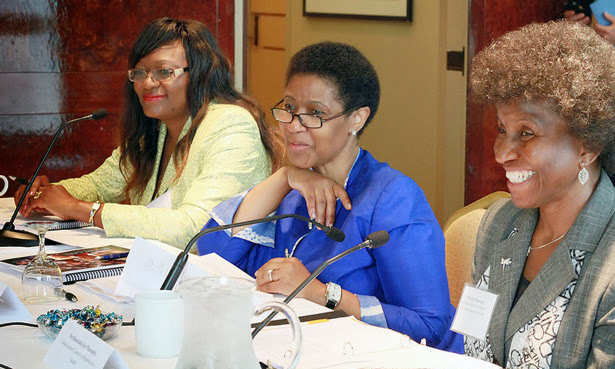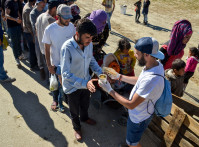-
African Leaders Urge Action to Meet (and Succeed) MDG 5
October 8, 2013 By Laurie Mazur
As world leaders gathered at the UN for a special event on achieving the Millennium Development Goals (MDGs) last month, there was much to celebrate. Some of the MDG targets – on poverty reduction and safe drinking water, for example – have been reached ahead of the 2015 deadline. But on MDG 5, which addresses maternal mortality and reproductive health, progress lags shamefully behind.
According to the Every Woman Every Child Independent Expert Review Group, “MDG 5 is the most off-track Millennium Development Goal of all. The failure to make more rapid progress on reducing maternal mortality is the most serious wound on the body of global health.”
The nations of Africa are farthest from achieving the targets set in MDG 5; only three African countries –Equatorial Guinea, Eritrea and Egypt – are currently on track.
To address this problem, more than a dozen African leaders and diplomats met in New York in advance of the special event. Led by Phumzile Mlambo-Ngcuka, the newly appointed executive director of UN Women, and Joy Phumaphi, chair of the Aspen Institute’s Global Leaders Council for Reproductive Health (GLC), the meeting was organized by GLC and the International Women’s Health Coalition. The goal: to assess the challenges, strategize solutions, and mobilize new support for reproductive health in Africa.
Big Problems, Basic Solutions
The challenges to achieving – and one day replacing – MDG 5 are daunting. Though maternal mortality has declined by nearly half since 1990, some 800 women die each day in pregnancy and childbirth – one every two minutes. The vast majority of those deaths are entirely preventable. More than half take place in Africa.
Why has progress stalled? “We took our eye off the ball,” Joy Phumaphi told the assembled leaders and diplomats. In recent years, she explained, African governments and donors have focused on HIV/AIDS and malaria, while neglecting primary health care. “Maternal and child health were once at the center of health care in developing countries. They no longer are.”
Culture presents formidable challenges, as well. According to Malawi Ambassador Charles Msosa, tradition holds that village elders decide whether a woman in labor should go to a health center, creating deadly delays. And, too often, men serve as gatekeepers to maternal care. “You have young women that cannot access health care because their husbands are not accompanying them,” said Tanzanian Ambassador Tuvako Manongi. “We need legislation to override some of these regressive cultural practices that provide barriers to access.”
Kavita Ramdas on why educating girls is not enough Resources and personnel are perennial challenges. “The gap between demand and availability of skilled staffing at health centers is huge,” said Manongi, citing a shortage of personnel, facilities and knowledge in rural areas.
Even simply getting to a health center can be an issue. Manongi recalled the devastating story of a laboring woman from her village who perished because her family could not afford to transport her to a health center just eight kilometers away.
The participants also shared hopeful stories. Some nations are going back to basics, focusing again on primary and maternal health.
In Malawi, President Joyce Banda, Africa’s second modern female head of state, has made women’s health and empowerment a centerpiece of her presidency. Recognizing the pivotal role of traditional leaders, Banda has launched an effort to educate Malawi’s 20,000 village chiefs about the importance of skilled birth attendants. And, to address the problem of getting laboring women to health care centers, Malawi is building “waiting homes” at hospitals, where women can stay in the last stages of pregnancy. It is a low-tech solution with significant benefits for maternal health. “You don’t have to be very sophisticated,” said Msosa, “There are small things that can be done.”
In Zambia, a new government restructured the nation’s health sector, committing new resources to maternal and child health. A decade ago, Zambia’s rates of HIV/AIDS and maternal and child mortality were among the world’s highest. But, between 2002 and 2010, Zambia achieved a 34 percent decline in maternal mortality. Still, as Zambian Ambassador Mwaba Kasese-Bota observed, significant challenges remain. Unsafe abortions account for nearly a third of maternal deaths in Zambia, and girls under the age of 18 are especially at risk.
Broad Implications
High rates of adolescent pregnancy and abortion speak to larger issues in girls’ and women’s lives. According to Zambia’s 2013 MDG Progress Report, “maternal mortality is rooted in gender inequality, which manifests itself as poor education for girls, early marriages, adolescent pregnancies, and lack of access to sexual and reproductive health information and services.” This means that sustained progress on maternal and reproductive health requires progress on gender equality.
At the same time, Mlambo-Ngcuka asserted that reproductive health is, in itself, a “game-changing” technology for development. Joy Phumaphi agreed, noting that contraceptives fight poverty by enabling parents to postpone childbearing until they have developed skills and income-earning ability. Moreover, reproductive health has been shown to have a positive impact on a vast array of development indicators, including child survival, environmental sustainability, and resilience. And reproductive health can help African nations jumpstart development by seizing the “demographic dividend.”
Preparing for 2015
As the 2015 deadline for achieving the MDGs draws near, the world’s nations are working to envision the next set of goals for global health and development. Can we assume that reproductive health, given its importance, will have a prominent place on that agenda?
Not necessarily, warned Phumaphi. She reminded participants that the first iteration of the MDGs did not contain a target on reproductive health. “Before the MDGs were adopted, all of us were convinced that sexual and reproductive health and rights would be central in the MDGs…and then they were not there,” she said. “We must not let that happen again.”
In the post-2015 negotiations, influential opposition groups could, once again, attempt to sideline reproductive health. “If we truly believe that this is central to our human wellbeing,” said Phumaphi, “then we must fight for this issue. We must put our necks on the line in the critical moments when the final decisions are being made.”
The leaders and diplomats in attendance took up the challenge, pledging to fight for reproductive health on the development agenda. The group plans to issue a joint statement, and to meet regularly to share information and strategy.
In her parting words, Phumzile Mlambo-Ngcuka offered this advice: “Mobilize, my brothers and sisters from the continent. Let’s make sure that we mobilize and lobby our leaders to help us deliver for the women of the world.”
Laurie Mazur is a consultant on population and the environment for the Wilson Center’s Environmental Change and Security Program and a writer and consultant to non-profit organizations. She is the editor, most recently, of A Pivotal Moment: Population, Justice and the Environmental Challenge.
Sources: Center for Strategic and International Studies, Nyasa Times, Tumwine and Dungare (1996), UN, UN Development Program, William and Flora Hewlett Foundation, World Bank, World Health Organization.
Photo Credit: Dr. Mwaba P. Kasese-Bota, Phumzile Mlambo-Ngcuka, and Joy Phumaphi, courtesy of UN Women.
Topics: Africa, demography, development, Dot-Mom, family planning, featured, gender, global health, HIV/AIDS, livelihoods, Malawi, maternal health, MDGs, population, poverty, SDGs, Zambia
 A Publication of the Stimson Center.
A Publication of the Stimson Center.






